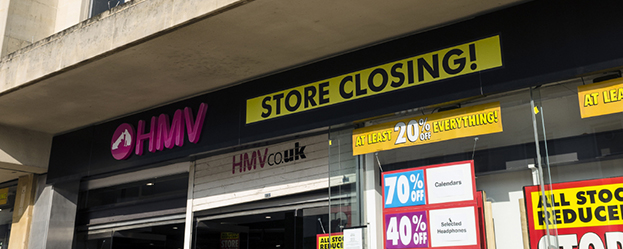This website uses cookies so that we can provide you with the best user experience possible. Cookie information is stored in your browser and performs functions such as recognising you when you return to our website and helping our team to understand which sections of the website you find most interesting and useful.
CMU Trends Retail
Trends: The HMV crash
By Chris Cooke | Published on Wednesday 15 January 2014

Given what happened at the start of the year, the UK’s flagship entertainment retailer ended 2013 in better health than many expected, though it’s future is still far from assured.
HMV’s fall into administration in January was not a surprise. The retailer had been sliding towards oblivion for some time, struggling to maintain debts amassed during an admirable but unsuccessful attempt to diversify five years earlier, and having sold off pretty much all but its core UK retail assets by the end of 2012. A disappointing Christmas quarter was always going to push the retail firm over the cliff, and indeed it did.
RESPONDING TO HMV’S DEMISE
The British record industry seemed desperate for HMV to survive, though not quite desperate enough for one of the majors to buy the ailing retailer. There were emotional reasons for this desire: record companies like there being a high profile music brand on the high street (and even though video and games have generated more revenue for HMV for years, it is still seen first and foremost as a music seller). But there were commercial reasons too: UK music retail may now be dominated by mail-order (mainly Amazon) and downloads (mainly iTunes), but the high street still leads when it comes to all-important impulse buy purchases.
As it turned out, the British public also seemed to want HMV to survive, with consumers joining journalists and artists in vocally wishing for the retailer to stay afloat (including some music hacks and rock stars who would once have dissed the HMV Group for shunning vinyl and being in cahoots with the majors). Though an outpouring of love for the old record shop brand in the days after it fell into administration – though heartening for those still working at the firm – wasn’t going to help in any tangible way. And so all eyes fell on retail restructuring group Hilco, which already owned HMV Canada, and was known to have its sights on the UK business too.
Though, in the four months it took Hilco to do the deal with HMV’s administrators, 103 stores were wound down, online operations were closed, the firm’s Irish business shut down more or less overnight, and there was a massive cull at the company’s distribution centre and London HQ. The latter was covered live online by an axed social media manager who still had access to the company’s Twitter feed. That HMV’s senior management hadn’t anticipated the need to take control of social media before firing everyone suggested that – while most of the big mistakes at the retailer took place over a decade ago – there were still issues at the top of the retail company even in its last year in business.
HILCO-OWNED HMV
But after all that turmoil, the new HMV that emerged was bigger than we expected (140 stores, including the legacy Fopp shops), and Hilco management – despite having a reputation for asset stripping dying retail businesses – managed to instill some confidence, in staff and the record industry, that there was reason to be optimistic about the future of this company.
Better rents were sought, a stronger focus on music and film was promised, the in-store live events programme was given a new boost, and in London the company’s flagship shop was moved to a smaller site a bit further up Oxford Street, a downwards step cleverly spun as a positive story: the new base was at the site of the very original HMV store. Elsewhere, some of the HMV shops shut during the administration were re-opened, and the brand even returned to Ireland, mainly via an alliance with another Hilco-owned company Xtra-vision.
Simply being in private ownership will help HMV for a while, no more quarterly helpings of doom and gloom financial results to publish, no more analysts pulling apart Christmas sales figures. And reduced rent obligations and a streamlined HQ will also make things easier.
HMV’S LONG TERM FUTURE
Whether Hilco can make HMV a going-concern long-term remains to be seen. CD and DVD sales will continue to decline, and – despite the launch of yet another new HMV download store in October – it’s hard to see the old fashioned retailer ever competing in the digital space. And the new HMV hasn’t even attempted, so far, to relaunch its mail-order business, possibly aware that it’s not equipped to fight a battle with Amazon.
So how can Hilco ensure HMV still delivers long-term? Although former HMV Group CEO Simon Fox’s attempts to diversify the brand proved expensive and ultimately unsuccessful, a mainstream entertainment retailer like HMV probably needs to watch how the record companies are adapting to the post-CD world. And that is by diversifying.
If the future success of the labels lies in merchandise, band-brand products (ie artist branded headphones, fashion, drinks etc) and premium fan services, then perhaps HMV should follow that route too – adding pop-up band-brand departments in store and focusing on the direct-to-fan space online.
For labels, the product, increasingly, will be the band not the record, and perhaps entertainment retailers should factor that into their plans.





